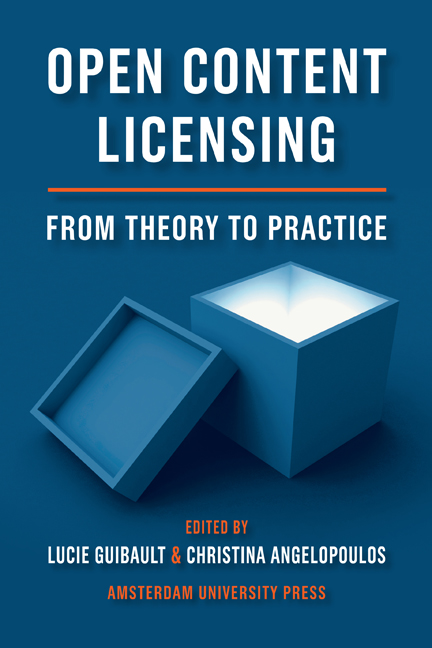Book contents
- Frontmatter
- Contents
- 1 Open Content Licensing: From Theory to Practice – An Introduction
- 2 Towards a New Social Contract: Free-Licensing into the Knowledge Commons
- 3 Is Open Content a Victim of its Own Success? Some Economic Thoughts on the Standardization of Licenses
- 4 (Re)introducing Formalities in Copyright as a Strategy for the Public Domain
- 5 User-Related Assets and Drawbacks of Open Content Licensing
- 6 Owning the Right to Open Up Access to Scientific Publications
- 7 Friends or Foes? Creative Commons, Freedom of Information Law and the European Union Framework for Reuse of Public Sector Information
- 8 Contributing to Conversational Copyright: Creative Commons Licenses and Cultural Heritage Institutions
- 9 Creative Commons and Related Rights in Sound Recordings: Are the Two Systems Compatible?
2 - Towards a New Social Contract: Free-Licensing into the Knowledge Commons
Published online by Cambridge University Press: 22 January 2021
- Frontmatter
- Contents
- 1 Open Content Licensing: From Theory to Practice – An Introduction
- 2 Towards a New Social Contract: Free-Licensing into the Knowledge Commons
- 3 Is Open Content a Victim of its Own Success? Some Economic Thoughts on the Standardization of Licenses
- 4 (Re)introducing Formalities in Copyright as a Strategy for the Public Domain
- 5 User-Related Assets and Drawbacks of Open Content Licensing
- 6 Owning the Right to Open Up Access to Scientific Publications
- 7 Friends or Foes? Creative Commons, Freedom of Information Law and the European Union Framework for Reuse of Public Sector Information
- 8 Contributing to Conversational Copyright: Creative Commons Licenses and Cultural Heritage Institutions
- 9 Creative Commons and Related Rights in Sound Recordings: Are the Two Systems Compatible?
Summary
‘Cooperation is more important than copyright’. (Stallman 1994)
The Paradox: Free and Expensive
The knowledge commons rests on the fundamental paradox of information goods: They are privately created with the intent of being published but, once published, they become part of general knowledge and open for all to reproduce and modify. Society created the social contract of copyright, granting a temporary privilege to authors in return for the publication of their works, because of its vital interest in these creations and an assumption that less will be produced if investments cannot be recouped. Thus, a paradox arises, as a result of the two mutually conflicting natures of information goods: As economic objects they need to generate revenues, which implies that free-riding through unpaid access, redistribution and the creation of derivatives of creative products must be excluded. As creative objects they necessarily build on the prior works of others and inspire new works by subsequent authors, meaning that an unbounded flow must be enabled to ensure a continuous creative process.
Copyright law acknowledges this tension and attempts to strike a balance by, on the one hand, enabling commercial exploitation through exclusive rights and, on the other, limiting the duration of these rights and exempting certain forms of copying and reuse. The rise of cultural industries during the twentieth century has tilted the balance in favour of viewing information goods as economic objects. The digital revolution then reformulated the paradox on a new media-technological level: information wants to be free and it wants to be expensive.
In terms of costs, the strategies for enforcing copyrights like DRM, internet filtering and excluding citizens from the internet are becoming increasingly extreme. Many people feel that the price society is paying within the social contract is too high. Many creatives feel that the mechanisms that allegedly protect their incentives to create are, in fact, stifling the creative process and do not benefit them, but rather benefit exploiters.
With regards to freedom, a countermovement at the very heart of the dynamics of the digital revolution carved out the freedoms necessary to sustain the creative process – starting with software, spreading to science, music, encyclopaedias and dictionaries, journalism and, indeed, to any cultural expression capable of being represented by bits.
- Type
- Chapter
- Information
- Open Content LicensingFrom Theory to Practice, pp. 21 - 50Publisher: Amsterdam University PressPrint publication year: 2012



